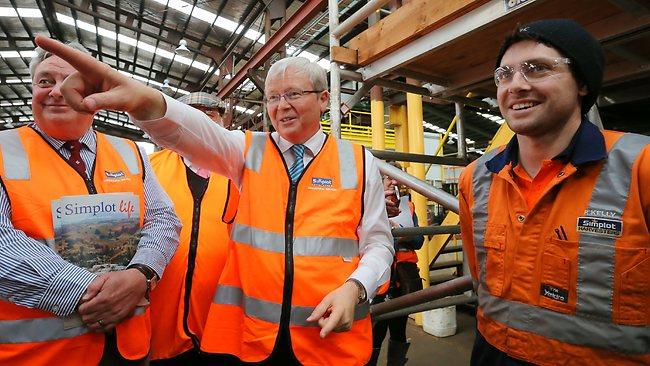TAFEs left to wither on the vine
VOCATIONAL training has become an integral part of the campaign.

THE most unusual thing about the role training has played in this election campaign is that it has played a role at all.
Skills made a late entry into the campaign via Tony Abbott's promise of HECS-type loans for apprentices - a pledge of policy substance, which Kevin Rudd has somewhat feebly countered with a $500 increase to apprentices' tools allowances.
Rudd was more on target with his intervention to save TAFEs, threatening a federal takeover if state governments didn't reverse the recent pattern of major funding cuts.
But that demand ignores the reality of market dynamics. How are state governments supposed to guarantee funding for the public provider while they respect the competitive neutrality of an open training market?
Labor has washed its hands of this problem, saying the mechanisms for allocating training funds are states' business. But Labor has its pawprints all over training markets, having nurtured the idea since its last stint in opposition.
Its Productivity Places Program was the prototype training market, and last year's Council of Australian Governments agreement (under any common English reading) mandates open competition for training funds.
Compare this with Labor's demand-driven system for higher education, where private colleges - and TAFEs - don't get a look-in. But vocational training is replete with these sorts of contradictions. In schooling, non-profit private schools get less funding than public schools, and for-profit schools get none.
In training, hundreds of for-profit colleges get public funding, and in Victoria, at least, they're funded on the same footing as public institutions.
This leaves TAFEs to "wither on the vine", as Rudd put it. They've become minority providers in Victoria and are headed the same way in South Australia, where their market share has plunged from 74 per cent to 62 per cent, according to the Australian Education Union. Both states have lost swaths of staff, and some regional TAFEs are already against the wall. Victoria and Queensland have been advised to privatise their TAFEs.
There are two schools of thought about whose fault all this is. One says TAFEs aren't nimble enough to cut it in the real world. The other says they're hamstrung by government rules and private colleges cherry-picking the profitable courses.
Either way, TAFEs appear set for the same fate as the Commonwealth Education Service and the NSW Adult Migrant Education Service, both of which quickly succumbed to open markets. As long as fully competitive training markets are envisaged, governments' rhetoric about maintaining a strong public provider is likely to be just rhetoric.
Rudd's pledge of an intervention isn't likely to be much more. But he has put TAFEs on the front page, and he has put his likely successors on notice. If they let TAFEs die in the ditch, they'll have to explain why.


